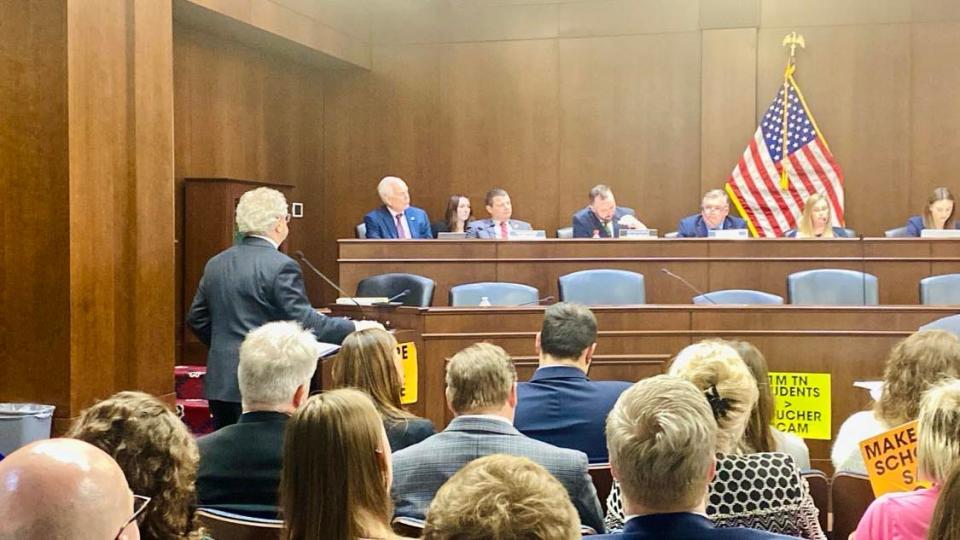Tennessee Gov. Bill Lee has proposed a new statewide voucher program that would offer $7,075 in public funds to 20,000 students to attend a private, independent school or to be used to support home schooling. As education researchers and experts on school choice, we have questions and concerns.
A key argument supporting vouchers is that they provide the option of choosing a better school to families who are otherwise assigned to high-poverty, low performing public schools in their neighborhood. The governor’s plan, however, emphasizes principles of liberty and parent empowerment for all families in the state, as expressed in the plan’s title: The Education Freedom Scholarship Act. Notably, the Act would make students eligible for vouchers regardless of family income or a child’s assigned public school’s performance.
The plan would set aside a percentage of vouchers for families with household incomes of 300% of the federal poverty level (about $93,000 for a family of four) in its first year only.
Counterpoint: TN Gov. Bill Lee isn’t wrong. Students deserve better school choices than they have now
This is the public (education) price of vouchers
In its initial year, the plan would cost an estimated $141.5 million in additional education funding. Opponents argue that vouchers drain taxpayer funds from already under-supported urban schools in ways that further undercut the abilities of traditional public schools to provide a high-quality education to students.

Vouchers can be used in schools with formal religious affiliations, which raises troubling questions regarding the use of public money for private-use religious schooling. Universal voucher programs can also increase segregation, as white families are more likely to choose schools with white students.
Decades of scholarly research indicate that academic outcomes for voucher students are mixed and modest – with most studies in the last decade finding negative impacts on student test scores. How will the state monitor the quality, access, and equity in these voucher-accepting schools? The plans differ here in important ways, with the governor’s plan lacking any school accountability guardrails that measure student growth and learning, and the Senate plan including a student testing requirement.
What should taxpayers ask and all parents demand?
We propose a set of pertinent and pressing questions for Tennessee policymakers, parents, and taxpayers as these voucher plans are debated.
-
How will voucher plan success be measured and monitored?
-
What academic quality measures will be monitored, and how will these be reported to the public?
-
Will student attrition be tracked?
-
Will student enrollment by school be made available?
-
How will policymakers assess the impact of vouchers on public school funding and performance?
-
How do the various voucher plans ensure equal opportunities for all parents to consider this option, apply, and participate?


Middle-class parents with the most time, knowledge, and connections are more likely to take advantage of and benefit from school choice. Making information simple and accessible, providing a centralized database of schools and school quality measures, and working with school staff to communicate can help reduce barriers. So can including protections for students with disabilities.
What will be the eligibility screening for private schools that wish to participate in the voucher program (i.e., prior years of student performance, financial records, admissions policies)?
Research suggests that some voucher plans are undercut by lax or vague rules that govern private school eligibility to receive public voucher dollars. Private schools that participate in vouchers out of financial need and necessity may have weak educational environments and financial uncertainty and instability. A choice among poor options is not a value proposition and is certainly not good public policy for the citizens and taxpayers in Tennessee.


At this point, the Tennessee voucher plans’ information dissemination, enrollment and participation criteria, and transportation design features are vague, unknown, or under-specified and should trigger public scrutiny and parent concern.
Claire Smrekar is an associate professor of public policy and education at Peabody College, Vanderbilt University.
Joanne Golann is an associate professor of public policy and education at Peabody College, Vanderbilt University.
This article originally appeared on Nashville Tennessean: School vouchers: Parents and taxpayers scrutinize expansion plan

Amanda Smith is a dedicated U.S. correspondent with a passion for uncovering the stories that shape the nation. With a background in political science, she provides in-depth analysis and insightful commentary on domestic affairs, ensuring readers are well-informed about the latest developments across the United States.







